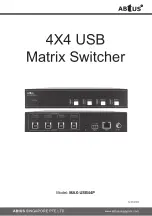
6-2
Catalyst 2975 Switch Software Configuration Guide
OL-19720-02
Chapter 6 Managing Switch Stacks
Understanding Stacks
Every member is uniquely identified by its own
stack member number
.
All members are eligible masters. If the master becomes unavailable, the remaining members elect a new
master from among themselves. One of the factors is the
stack member priority value
. The switch with
the highest stack-member priority-value becomes the master.
The system-level features supported on the master are supported on the entire stack.
If a switch in the stack is running the cryptographic version of the software image, we recommend that
this switch be the stack master.
The master contains the saved and running configuration files for the stack. The configuration files
include the system-level settings for the stack and the interface-level settings for each member. Each
member has a current copy of these files for back-up purposes.
You manage the stack through a single IP address. The IP address is a system-level setting and is not
specific to the master or to any other member. You can manage the stack through the same IP address
even if you remove the master or any other member from the stack.
You can use these methods to manage stacks:
•
Network Assistant (available on Cisco.com)
•
Command-line interface (CLI) over a serial connection to the console port of any member
•
A network management application through the Simple Network Management Protocol (SNMP)
Note
Use SNMP to manage network features across the stack that are defined by supported MIBs. The
switch does not support MIBs to manage stacking-specific features such as stack membership
and election.
•
CiscoWorks network management software
To manage stacks, you should understand:
•
These concepts on stack formations:
–
–
•
These concepts on stack and member configurations:
–
–
–
Member Priority Values, page 6-6
–
Stack Offline Configuration, page 6-7
–
Stack Software Compatibility Recommendations, page 6-9
–
Stack Protocol Version Compatibility, page 6-9
–
Major Version Number Incompatibility Among Switches, page 6-9
–
Minor Version Number Incompatibility Among Switches, page 6-9
–
Incompatible Software and Member Image Upgrades, page 6-13
–
Stack Configuration Files, page 6-13
–
Additional Considerations for System-Wide Configuration on Switch Stacks, page 6-13
















































